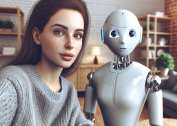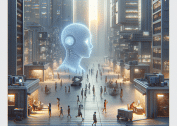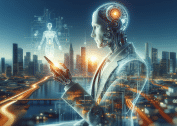Explore how artificial intelligence impacts your daily routines, from smart homes to personalized online experiences. This guide covers the latest breakthroughs, unexpected applications, and key concerns, weaving together tech and science in ways that may surprise you.
Emerging Trends in Artificial Intelligence
Artificial intelligence is quietly becoming part of everyday living, changing how people work, play, and connect. Subtle but powerful, AI technology powers everything from the voice assistants in smartphones to recommendations on streaming platforms. The growth of machine learning has made it possible for systems to analyze behavior and adapt responses, creating experiences that feel tailored and intuitive. More recently, algorithm improvements are allowing for enhanced pattern recognition and even creativity, like generating artwork or composing music. These trends are not isolated to research labs; they touch daily life in ways that often go unnoticed.
The expansion of AI goes beyond entertainment and convenience. Machine learning now finds patterns in massive medical datasets, assisting healthcare providers with early diagnosis and targeted treatment plans. Public transportation, logistics, and manufacturing lines have all started integrating intelligent automation to maximize efficiency. In the classroom, adaptive learning platforms powered by AI provide personalized study paths that help students master challenging subjects. What appears to be simple software is often supported by deep neural networks in the background, shaping outcomes with every tiny interaction.
Staying current with rapid AI progress demands continual learning. Developer communities and open-source projects fuel innovation, making advanced tools available to more people. Even those without technical training benefit, as businesses and governments apply AI to solve real-world problems—from climate modeling to fraud detection. The ripple effect creates new ethical and social questions, and understanding these trends means recognizing both opportunities and limitations. Exploring the ever-changing landscape of tech can be fascinating for anyone eager to see how artificial intelligence may next change the world.
Smart Homes and Personal Assistants
Smart homes are evolving fast, transforming living spaces through the integration of artificial intelligence. Voice-activated assistants manage everything from music requests to calendar reminders. Connected devices, like thermostats and security systems, learn routines and adjust automatically. Families find it easier to save energy and increase comfort, without constant manual control. Technology once seen as futuristic quickly becomes part of household routines.
AI-driven personal assistants excel in managing information and automating small tasks. These systems analyze preferences to serve up personalized news, suggest recipes for dinner, or remind about important appointments. The underlying technology tracks user habits and anticipates needs, enabling proactive support. Integration with other smart gadgets, like lighting and appliances, creates seamless experiences tailored for each household member.
Privacy and security remain important topics in the smart home landscape. As more devices collect and transmit data, concerns grow over how information is stored or shared. Industry standards continue to evolve, aiming to protect sensitive details without losing convenience. Users can make informed choices by understanding how artificial intelligence algorithms power daily life behind the scenes and what steps to take to safeguard personal information.
AI in Healthcare: Diagnosis and Discovery
Artificial intelligence plays a transformative role in healthcare by accelerating diagnosis and supporting the discovery of new treatments. Machine learning tools sift through medical images, lab results, and patient histories to identify signs that may otherwise go undetected. Clinicians use AI-driven platforms to prioritize care for individuals at risk, streamlining the decision-making process in emergency rooms and doctor’s offices. By comparing vital data in seconds, these platforms enhance the accuracy of diagnoses, even for rare conditions.
Beyond diagnosis, AI helps researchers develop new medications and therapies. Algorithms process vast libraries of chemical compounds to predict which might interact with disease targets. This not only shortens development timelines for potential treatments but also lowers the cost of drug discovery. By reducing the number of necessary laboratory experiments, artificial intelligence allows for faster pivots when unexpected results arise. These advances impact global health, opening new avenues to address illnesses that previously lacked effective options.
Concerns about transparency, equity, and safety remain central to the conversation about AI in healthcare. Ensuring that machine learning models do not perpetuate historical biases or overlook specific populations is a growing focus. Ongoing research into explainable AI seeks to demystify why smart systems make certain recommendations. Patients and providers alike benefit from greater understanding, ensuring that these intelligent technologies enhance, rather than replace, the human touch in medicine.
Personalized Online Experiences and AI Algorithms
AI-driven personalization shapes nearly every digital encounter. Search engines and social media platforms employ algorithms that curate content to suit individual interests. When browsing for shoes or reading the news, results are tailored not just by past choices but also by real-time trends and user behavior. The effect widens the range of options people see while also helping brands connect with audiences more efficiently. The connection between artificial intelligence and digital marketing runs deep.
Streaming services rely on advanced recommendations to keep viewers engaged. By analyzing viewing history and preferences, AI suggests what to watch next, often introducing genres or creators that would stay hidden. This technology adapts quickly, changing its approach with each interaction to deliver more meaningful and relevant suggestions. The aim is to boost user satisfaction, but it also creates questions about how algorithmic bias may shape opinions and discovery on the internet.
The power of these systems lies in their ability to learn and evolve. Continuous feedback loops feed fresh data back into the engine, making outcomes more accurate over time. For consumers, this means discovering new hobbies, music, or communities that fit personal interests. Awareness of how these intelligent algorithms operate becomes essential as society navigates data privacy, filter bubbles, and the search for a diverse set of online experiences.
Artificial Intelligence and the Future of Work
The workplace is being reshaped by artificial intelligence in complex ways. Automation tools handle repetitive tasks, freeing up time for creativity and problem-solving. Smart scheduling, for example, uses natural language processing to organize meetings with minimal manual intervention. AI also assists with resume screening or performance feedback, streamlining HR operations and allowing managers to focus on more strategic activities.
Concerns about job displacement due to automation receive much attention, yet new roles also emerge as a result. Specialists in data science and AI training are in demand. Many organizations need professionals who can interpret results and ensure that artificial intelligence outcomes align with business goals. Upskilling and ongoing learning are key themes for workers looking to thrive in this evolving landscape. Some platforms offer accessible tech courses covering popular AI skills, sometimes at no cost to learners.
Embracing artificial intelligence at work means cultivating digital literacy and adaptability. Transparent workplace policies can foster trust around the use of smart tools and clarify how decisions are made. In forward-thinking organizations, AI complements rather than replaces human expertise. The focus is shifting toward collaboration between people and intelligent systems, producing a workplace where technology handles the routine and humans drive innovation.
Ethics, Challenges, and the Road Ahead
The rapid growth of artificial intelligence invites deep questions about ethics and responsibility. Issues like data privacy, algorithmic bias, and accountability shape public debate and influence regulatory action. Researchers and policymakers work together to ensure that AI benefits society without reinforcing discrimination or compromising security. Creating fair and transparent systems requires diverse perspectives from technologists, ethicists, and community members alike.
AI is not infallible. Mistakes can happen, especially when models are trained on incomplete or biased datasets. Addressing these risks means building systems that explain their reasoning and allow for human oversight. Initiatives in explainable and interpretable artificial intelligence seek to make technology more trustworthy and understandable. Responsible AI development emphasizes fairness, inclusivity, and ongoing evaluation at every stage.
The next generation of artificial intelligence promises breathtaking innovation. Quantum computing, advanced robotics, and self-improving models hint at possibilities that challenge our imagination. Moving forward, the balance between progress and protection will guide AI’s role in science and society. Remaining aware and informed empowers everyone to play a part in shaping this technological future for the greater good.
References
1. U.S. National Institute of Standards and Technology. (n.d.). Artificial Intelligence. Retrieved from https://www.nist.gov/artificial-intelligence
2. World Health Organization. (n.d.). Ethics and Governance of Artificial Intelligence for Health. Retrieved from https://www.who.int/publications/i/item/9789240029200
3. Stanford University. (n.d.). Artificial Intelligence Index Report. Retrieved from https://aiindex.stanford.edu/report/
4. Pew Research Center. (n.d.). AI and Human Enhancement. Retrieved from https://www.pewresearch.org/internet/2021/06/24/experts-say-the-rise-of-artificial-intelligence-will-make-most-people-better-off-over-the-next-decade/
5. Massachusetts Institute of Technology. (n.d.). Responsible AI. Retrieved from https://responsible.ai/
6. U.S. Department of Energy. (n.d.). Artificial Intelligence in Science. Retrieved from https://www.energy.gov/science/articles/artificial-intelligence-science









